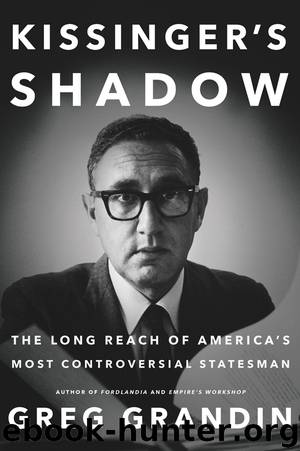Kissinger's Shadow by Greg Grandin

Author:Greg Grandin
Language: eng
Format: epub
ISBN: 9781627794503
Publisher: Henry Holt and Co.
9
Cause and Effect
Values are, at best, a mode of causality. The mystery of life is limited by classifiable data; it exhausts itself in the riddle of the first cause.… Resignation as to the purposes of the universe serves as the first step toward ethical activity and the realization ensues that the meaning of history is not confined to its mere manifestations and that no causal analysis can absolve Man from giving his own content to his own existence.
—Henry Kissinger
On April 15, 1998, Pol Pot, the former leader of the Khmer Rouge, died in Cambodia, an old man with no remorse. A few months earlier, a journalist had asked him if he felt regret for the crimes committed against the Cambodian people—over a million people died after he took power in 1975. No, he answered. “My conscience is clear.” “We had to defend ourselves,” Pol Pot said, referring to the revolution’s enemies.1
Henry Kissinger has faced similar questions about his role in Cambodia. Did he have “any pangs of conscience,” Die Zeit asked him in 1976, about a year after the fall of Phnom Penh to Pol Pot’s rebels. No, Kissinger said. North Vietnamese troops had invaded first and they were using Cambodian sanctuaries to kill American soldiers. “I may have a lack of imagination,” Kissinger told the German magazine, “but I fail to see the moral issue involved.” America, Kissinger said elsewhere, had to “defend itself.”2
In 1979, not long after Kissinger left office, a British journalist, William Shawcross, published a best-selling book called Sideshow: Kissinger, Nixon, and the Destruction of Cambodia, which called him to account not just for his illegal war but for its subsequent effects: by polarizing Cambodia with a massive bombing campaign, Shawcross argued, Kissinger created the conditions for the triumph of the Khmer Rouge. “The Khmer Rouge were born out of the inferno that American policy did much to create.”3 The accusation gnawed at Kissinger. He devoted a considerable number of pages in each of his three memoirs, and in almost every other book he wrote, defending himself against the accusation that he was to blame for the rise of Pol Pot. Finally, by 1998, with the Cold War over and Kissinger well settled in his role as America’s statesman emeritus, the matter seemed to be behind him.
But then Pol Pot died, and Kissinger once again found himself rehearsing arguments that he first started making in 1969: North Vietnam had violated Cambodia’s sovereignty first; the neutral country had become a haven for enemies of the United States; and America took care not to target civilians, just Vietcong and North Vietnamese. Interviewed by the BBC about Pol Pot’s legacy, Kissinger used the phrase “the so-called bombing of Cambodia.” The Guardian quipped the next day that this was “presumably … distinct from a proper bombing which would have destroyed the entire Cambodian infrastructure and traumatized the entire Cambodian people—not just a large proportion of both.”4
The BBC interviewer also asked Kissinger the question “Do you feel responsible?” “Absolutely,” Kissinger replied. “I feel just as responsible as you should feel for the Holocaust because you bombed Hamburg.
Download
This site does not store any files on its server. We only index and link to content provided by other sites. Please contact the content providers to delete copyright contents if any and email us, we'll remove relevant links or contents immediately.
The Secret History by Donna Tartt(19084)
The Social Justice Warrior Handbook by Lisa De Pasquale(12190)
Thirteen Reasons Why by Jay Asher(8907)
This Is How You Lose Her by Junot Diaz(6885)
Weapons of Math Destruction by Cathy O'Neil(6279)
Zero to One by Peter Thiel(5800)
Beartown by Fredrik Backman(5751)
The Myth of the Strong Leader by Archie Brown(5507)
The Fire Next Time by James Baldwin(5442)
How Democracies Die by Steven Levitsky & Daniel Ziblatt(5218)
Promise Me, Dad by Joe Biden(5153)
Stone's Rules by Roger Stone(5087)
A Higher Loyalty: Truth, Lies, and Leadership by James Comey(4959)
100 Deadly Skills by Clint Emerson(4924)
Rise and Kill First by Ronen Bergman(4788)
Secrecy World by Jake Bernstein(4751)
The David Icke Guide to the Global Conspiracy (and how to end it) by David Icke(4717)
The Farm by Tom Rob Smith(4507)
The Doomsday Machine by Daniel Ellsberg(4490)
